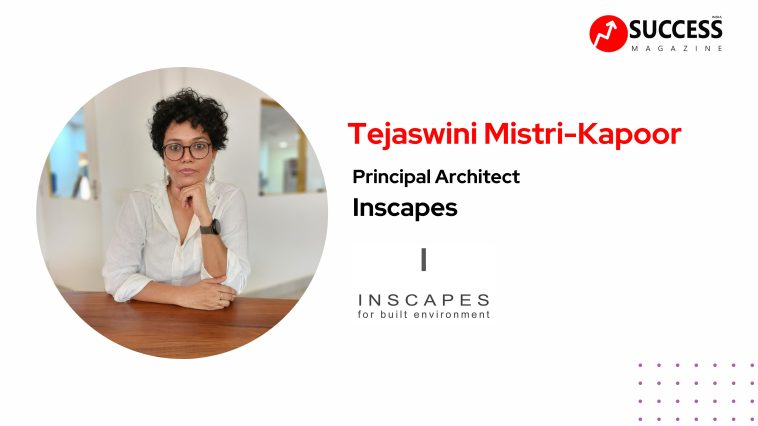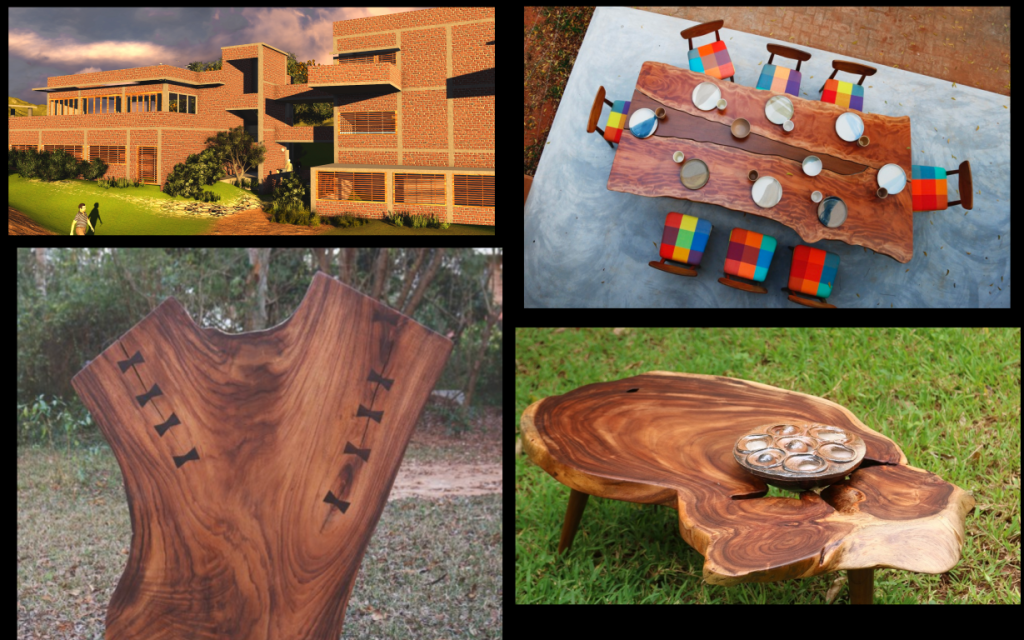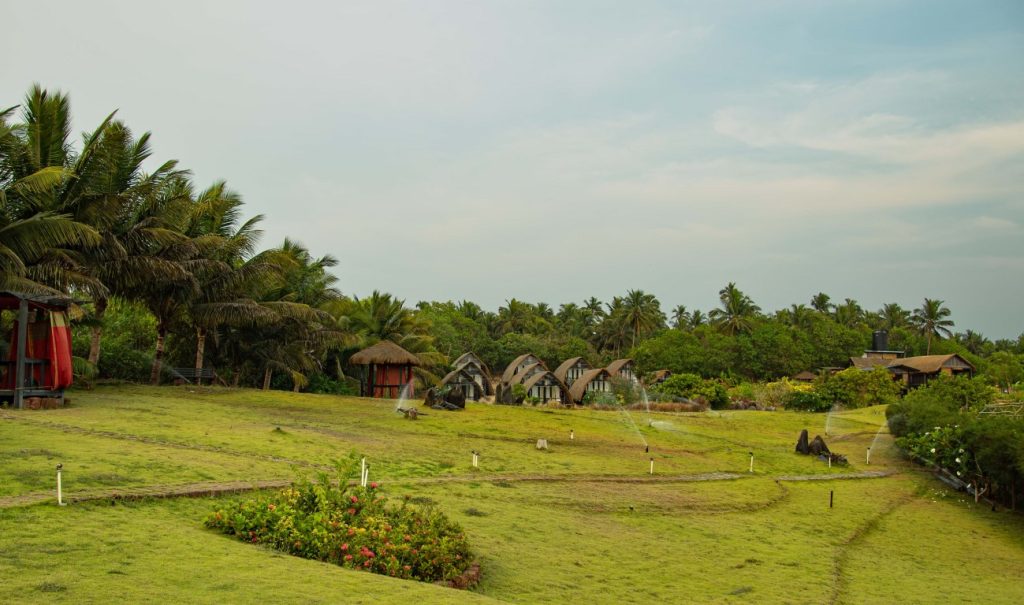In the world of architecture, where creativity intersects with functionality, Tejaswini Mistri-Kapoor stands out as a beacon of innovation and sustainability. As the Principal Architect and Founder of Inscapes, located in the serene and experimental landscape of Auroville, Tamil Nadu, Tejaswini’s journey is a testament to her deep-rooted passion for architecture and her unwavering commitment to creating spaces that resonate with both nature and humanity.
A Journey from Curiosity to Purpose
Tejaswini’s path to becoming an architect was not a straightforward one. From an early age, she was fascinated by the interplay between form, function, and space, often spending hours sketching and dreaming up innovative designs. Her initial interest lay in psychology—a field she believed could help her understand human behavior and contribute meaningfully to society. However, the lack of guidance in pursuing this path led her to explore other options, eventually finding her true calling in architecture.
This choice was driven by her keen eye for design and her desire to address social and environmental challenges through the built environment. For Tejaswini, architecture was not just a profession; it was a means to merge creativity with purpose, offering solutions that could impact society in profound ways.
The Auroville Influence: A Foundation for Sustainable Design
The most significant influence on Tejaswini’s architectural journey has been Auroville, the international township dedicated to human unity and sustainable living. Having lived there for over two decades, Auroville’s ethos of conscious living deeply impacted her approach to design. The town’s experimental nature and commitment to harmony between the built environment and the natural world provided the perfect backdrop for Tejaswini’s professional growth.
Inspired by Auroville’s principles, Tejaswini established her design studio, Inscapes, in 2011. Her vision was clear: to create spaces that not only serve functional needs but also nurture the well-being of their inhabitants while respecting the environment. Her experiences in Auroville instilled in her a profound sense of responsibility towards sustainable practices and community-centric design, elements that have become the cornerstones of her architectural practice.
Building Inscapes: From Architecture to Furniture
After gaining valuable experience working with renowned architect Suhasini Ayer in Auroville, Tejaswini felt a strong desire to channel her passion for innovative design and sustainable living into her own venture. Drawing on the principles of Auroville’s architecture, as well as her hands-on experience with projects ranging from residential buildings to community centers and educational institutions, she founded Inscapes with a vision to create spaces that harmonize with their environment, enhance human experience, and foster a sense of community.
But Tejaswini’s creative pursuits didn’t stop at architecture. In 2012, she ventured into furniture design with the brand Woodscapes, an endeavor born out of her dedication to sustainable design and a deep connection to nature. This new venture was uniquely initiated by repurposing wood felled by a cyclone—a natural disaster transformed into an opportunity for creativity and ecological responsibility. Tejaswini’s design style in furniture, much like her architectural work, is characterized by minimalism, the use of natural materials, and a profound respect for the environment.
Her admiration for George Nakashima, a pioneer in woodworking, further shaped her approach to furniture design. Nakashima’s belief in the spiritual and philosophical significance of wood resonated with Tejaswini, who, like him, believes that each piece of wood has its own story and soul. This philosophy is evident in her work, where she honors the natural beauty and imperfections of the material, creating functional yet aesthetically pleasing pieces that harmonize with their surroundings.
The Philosophy Behind Inscapes
Tejaswini’s approach to architecture is not merely about creating physical structures; it is about shaping environments that influence social dynamics, cultural expression, and the quality of life. At Inscapes, the focus is on integrating sustainable practices into every project, whether large or small. This is achieved through efficient building design, energy-efficient technologies, and a holistic understanding of the social, environmental, and economic factors at play.
One of the key challenges Tejaswini faces as an architect and entrepreneur is balancing creativity with the demands of running a business. Financial management, in particular, can be tricky and time-consuming, especially when striving to find clients who share her philosophy of balancing human needs with nature and economy. To overcome these challenges, Inscapes employs various strategies, including an integrative design process that promotes collaboration and holistic planning, sustainable practices that minimize environmental impact, and human-centered design that prioritizes comfort, health, and well-being.
A hallmark of Tejaswini’s work is her commitment to ensuring that every project incorporates natural elements and responds to the local climate and geography. This approach not only enhances the sustainability of her projects but also fosters a deeper connection between the occupants and their environment.
A Project Close to the Heart: Golven Beach Resort
Among the many projects Tejaswini has undertaken, the Golven Beach Resort in Vengurla stands out as particularly close to her heart. This project was challenging due to its location within the Coastal Regulation Zone (CRZ), an ecologically sensitive area. The resort’s design required careful consideration to preserve the natural dunes while ensuring that the structures offered unobstructed views of the ocean.
Tejaswini’s solution was to use only local materials such as laterite, bamboo, and thatch, and to complete the entire project without the use of cement. The result was a resort that not only blended seamlessly with its surroundings but also set a new standard for eco-friendly design in sensitive areas.
The Shift Towards Sustainable Architecture
The global trend towards sustainable and green architecture is one that Tejaswini wholeheartedly supports. For her, it is not just a trend but an urgent necessity in the face of climate change, resource depletion, and environmental degradation. However, she is also cautious about the potential for “greenwashing,” where sustainable practices are superficially adopted without substantial impact.
True sustainability, in her view, requires a deep, genuine commitment to environmental principles, starting from the initial stages of planning and continuing through every aspect of design and construction. This involves thoughtful site selection, the use of sustainable materials, and a holistic integration of environmental considerations into the entire project.
Tejaswini believes that sustainable architecture must move beyond superficial efforts to create buildings that are not only environmentally responsible but also economically viable and socially beneficial. This approach, she argues, can lead to meaningful change in the built environment, making it more resilient and adaptive to the challenges of the future.
Understanding the Client: A Collaborative Approach
For Tejaswini, understanding the psychology and requirements of her clients is as important as having technical knowledge and skill in architecture. In her practice, she treats clients as integral members of the project team, recognizing that successful architecture is a collaborative effort that requires mutual trust and open communication.
Architecture projects often span several years, and throughout this process, it is crucial to consider the unique personal experiences and cultural backgrounds of the clients. By acknowledging these factors, Tejaswini tailors her designs to reflect the identity and values of her clients while also guiding them to align with the architectural vision of the project.
This collaborative approach ensures that the spaces Tejaswini creates are not just functional and aesthetically pleasing but also deeply resonant with the people who will inhabit them.
Lessons from the Profession
With over two decades of experience, Tejaswini has learned to navigate the complexities of long-term projects, becoming more resilient and patient in the process. Her journey in architecture has also taught her the importance of being sensitive and responsible towards cultural and local contexts, a lesson that is reflected in every project she undertakes.
Architecture, as Tejaswini sees it, is a blend of art, science, and business, requiring a diverse skill set that extends beyond technical expertise. This ever-evolving profession offers endless opportunities for learning, and Tejaswini remains committed to growing and adapting her practice in response to new challenges and discoveries.
A Message to Budding Architects and Designers
Tejaswini’s message to aspiring architects and designers is clear: never stop asking questions, and let curiosity be the engine of your creativity. She encourages young professionals to explore new materials, study diverse architectural styles, and immerse themselves in different cultures, as each discovery adds depth and breadth to their design palette.
She also emphasizes the importance of designing with people in mind, understanding the needs, behaviors, and experiences of those who will interact with the spaces they create. Empathy, she believes, is a powerful tool in making spaces that enhance well-being and foster community.
In the age of Artificial Intelligence, Tejaswini advises budding architects to remain grounded in their creativity, to listen to their emotions and intuitions, and to use AI wisely without becoming overly reliant on it.
Finally, she urges young professionals to let their passion for design guide them, as it is passion that fuels creativity, drives innovation, and inspires those around them. “Your journey as an architect or designer is just the beginning,” she says. “Embrace the challenges, celebrate the victories, and never lose sight of the impact your work can have on the world.”
The Road Ahead for Inscapes
As Inscapes continues to grow, Tejaswini remains dedicated to her vision of architecture and design as catalysts for positive change. Guided by the principles of sustainability, inclusivity, and human-centered design, she looks forward to creating more spaces that inspire, uplift, and harmonize with their environment.
With her firm firmly rooted in the values of Auroville and her work continually pushing the boundaries of what sustainable architecture can achieve, Tejaswini Mistri-Kapoor is not just designing buildings; she is shaping the future of how we live, work, and connect with the world around us.




